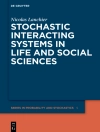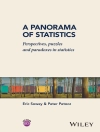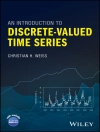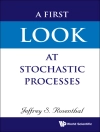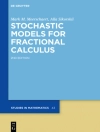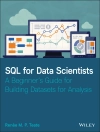Multivariate statistical analysis has undergone a rich and varied evolution during the latter half of the 20th century. Academics and practitioners have produced much literature with diverse interests and with varying multidisciplinary knowledge on different topics within the multivariate domain. Due to multivariate algebra being of sustained interest and being a continuously developing field, its appeal breaches laterally across multiple disciplines to act as a catalyst for contemporary advances, with its core inferential genesis remaining in that of statistics.
It is exactly this varied evolution caused by an influx in data production, diffusion, and understanding in scientific fields that has blurred many lines between disciplines. The cross-pollination between statistics and biology, engineering, medical science, computer science, and even art, has accelerated the vast amount of questions that statistical methodology has to answer and report on. These questions are often multivariate in nature, hoping to elucidate uncertainty on more than one aspect at the same time, and it is here where statistical thinking merges mathematical design with real life interpretation for understanding this uncertainty.
Statistical advances benefit from these algebraic inventions and expansions in the multivariate paradigm. This contributed volume aims to usher novel research emanating from a multivariate statistical foundation into the spotlight, with particular significance in multidisciplinary settings. The overarching spirit of this volume is to highlight current trends, stimulate a focus on, and connect multidisciplinary dots from and within multivariate statistical analysis. Guided by these thoughts, a collection of research at the forefront of multivariate statistical thinking is presented here which has been authored by globally recognized subject matter experts.
Tabella dei contenuti
Preface.- PART 1: Trends in Multi- and Matrix-Variate Analysis.- Q. Guo, X. Deng and N. Ravishanker: Association-based Optimal Subpopulation Selection of Multivariate Data.- T. B. Mattos, L. A. Matos, V. H Lachos Aldo: Likelihood-Based Inference For Linear Mixed-Effects Models With Censored Response Using Skew-Normal Distribution.- Y. Melnykov, M. Perry, V. Melnykov: Robust Estimation of Multiple Change Points in Multivariate Processes.- T. Botha, J. T Ferreira and A. Bekker: Some Computational Aspects Of A Noncentral Dirichlet Family.- Y. Murat Bulut and Olcay Arslan: Modeling Handwritten Digits Dataset Using The Matrix Variate T Distribution.- B. Byukusenge, D. von Rosen and M. Singull: On The Identification Of Extreme Elements In A Residual For The Gmanova-Manova Model.- M. Billio, R. Casarin, M. Costola and M. Iacopini: Matrix-variate Smooth Transition Models for Temporal Networks.- H. Baghishani and J. Ownuk: A Flexible Matrix-Valued Response Regression For Skewed Data.- J. Trink, H. Haghbin and M. Maadooliat: Multivariate Functional Singular Spectrum Analysis: A Nonparametric Approach for Analyzing Functional Time Series.- M. Greenacre: Compositional Data Analysis — Linear Algebra, Visualization And Interpretation.- A. Alzaatreh, F. Famoye and C. Lee: Multivariate Count Data Regression Models And Their Applications.- A. Iranmanesh, M. Rafiei and D. Nagar: A Generalized Multivariate Gamma Distribution.- PART 2: Aspects of High Dimensional Methodology and Bayesian Learning .- G. D’ Angella and C. Hennig: A Comparison Of Different Clustering Approaches For High-Dimensional Presence-Absence Data.- S. Millard, M. Arashi and G. Maribe: High-Dimensional Feature Selection For Logistic Regression Using Blended Penalty Functions.- I. Munaweera, S. Muthukumarana and M. Jafari Jozani: A Generalized Quadratic Garrote Approach Towards Ridge Regression Analysis.- M. Roozbeh: High Dimensional Nonlinear Optimization Problem In Semiparametric Regression Model.- PART 3: Frontiers in Robust Analysis and Mixture Modelling.- A. Punzo and S. D. Tomarchia: Parsimonious Finite Mixtures Of Matrix-Variate Regressions.- F. Zehra Doğru and Olcay Arslan:Robust Multivariate Modelling for Heterogeneous Data Sets With Mixtures of Multivariate Skew Laplace Normal Distributions.- M. Norouzirad, M. Arashi, F. J Marques and F. Esmaeili: Robust Estimation Through Preliminary Testing Based On The Lad-Lasso.
Circa l’autore
Andriëtte Bekker is a full professor in Statistics, at the University of Pretoria, South Africa. Her expertise lies in Distribution theory learning, Unsupervised learning, Network learning and Software learning. She is the academic research leader of the Statistical Theory and Applied Statistics focus area within the Department of Science as well as in the Technology/National Research Foundation (DST-NRF) Centre of Excellence in Mathematical and Statistical Sciences. She has published more than 100 peer-reviewed papers in fundamental statistical research. She contributes significantly to the human capacity development of Southern Africa through the multitude of students for whom she acts as supervisor and mentor.
Johannes T. Ferreira is an associate professor in the Department of Statistics, at the University of Pretoria, South Africa, and is Junior Focus Area Coordinator for the Statistical Theory and Applied Statistics focus area of the Centre of Excellence in Mathematical and Statistical Science, based at the University of the Witwatersrand in Johannesburg. He regularly publishes in accredited peer-reviewed journals and reviews manuscripts for international journals. He is an ASLP 4.1/4.2 fellow of Future Africa and has been identified as one of the Top 200 South Africans under the age of 35 by the Mail & Guardian newspaper in the Education category in 2016.
Mohammad Arashi is an Associate Professor and Director of the Data Science Laboratory at the Ferdowsi University of Mashhad in Iran, and an Extraordinary Professor at the University of Pretoria in South Africa. He is the author of 3 books with Wiley and an elected member of ISI. He has published more than 150 papers and his major includes shrinkage estimation, variable selection, high-dimensional statistics, graphical models, and longitudinal data analysis.
Ding-Geng Chen is an elected fellow of the American Statistical Association and an elected member of the International Statistical Institute. He is currently the executive director and professor in biostatistics at the College of Health Solutions, Arizona State University, USA. Professor Chen is also the DST-NRF-SAMRC research chair in Biostatistics and an Extraordinary Professor at the Department of Statistics, University of Pretoria, South Africa. He is also a senior consultant for biopharmaceuticals and government agencies with extensive expertise in clinical trial biostatistics and public health statistics. Professor Chen has written more than 200 refereed publications and co-authored/co-edited 33 books on clinical trial methodology, meta-analysis, causal-inference and public health statistics.






